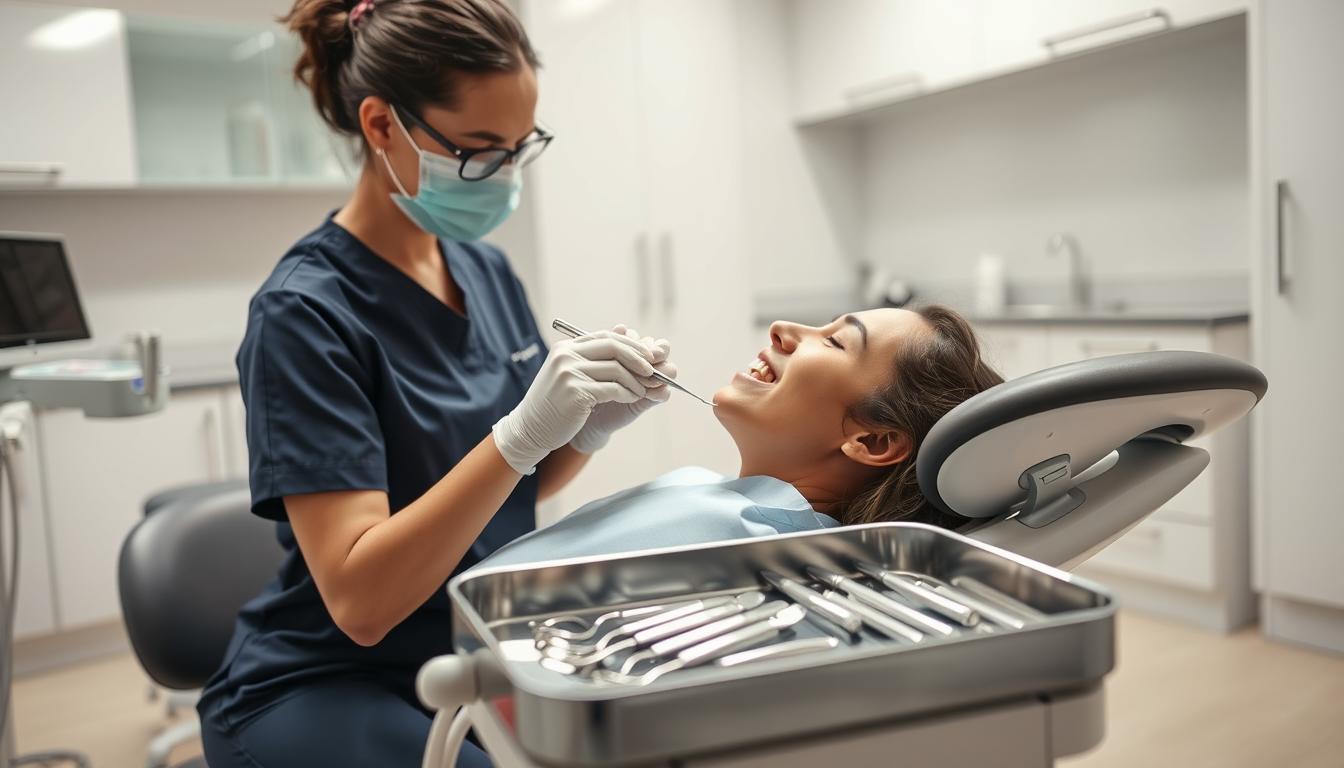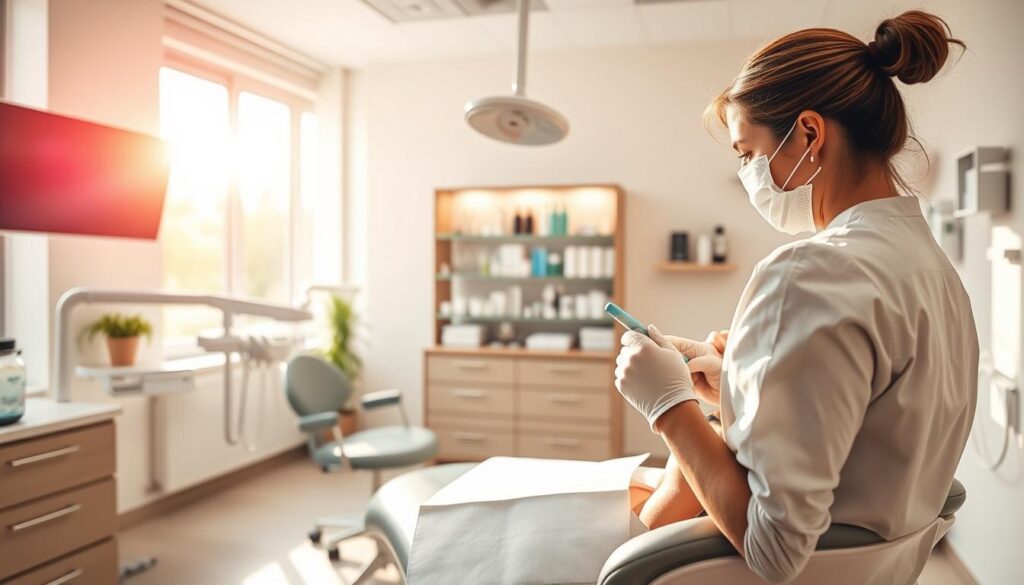Risks of Skipping Regular Dental Cleanings

Every year, a shocking 100 million Americans don’t visit a dentist. Access to dental care isn’t the issue. This neglect raises the risks of not getting regular dental cleanings. These risks can lead to serious oral hygiene consequences. The problems don’t just stop in the mouth; they can affect your whole health. Dental pros stress the need for routine visits. They’re vital not just for a nice smile, but for spotting early signs of major health issues.
Missing dental check-ups is a bad move for your mouth’s health. Skipping these visits lets plaque and tartar build up, ruining your smile. It can start serious problems like gum disease and tooth loss. What’s worse, poor oral care is linked to heart disease and diabetes. This shows how connected our oral and overall health really are.
Key Takeaways
- Skipping dental appointments can increase the risk for tooth decay and gum disease.
- Regular dental cleanings are instrumental in preventing oral health conditions.
- Poor oral hygiene has been associated with elevated risks for systemic illnesses like heart disease and diabetes.
- Routine dental check-ups provide opportunities for early detection of serious diseases, including oral cancer.
- Overall well-being and quality of life can be negatively impacted by inadequate oral care.
Introduction to Dental Health
Seeing your dentist regularly is key to keeping your teeth healthy. These visits are more than just treatments; they include preventive care too. By understanding why dental visits are important and taking steps in preventive dental care, you help keep both your mouth and body healthy. Regular check-ups stop plaque and tartar from building up, which if ignored, can cause major dental problems.
Importance of Regular Dental Care
Getting regular dental care stops many tooth and gum diseases. It’s crucial for keeping your mouth healthy over time. Besides keeping your teeth clean, it brings big benefits of dental cleanings. A brighter smile is just one plus; it also boosts your overall health and lowers the risk of serious health issues tied to dental problems.
Overview of Dental Cleanings
Dental cleanings remove plaque and tartar, the main causes of gum disease and cavities. These cleanings are thorough with professionals and include polishing and possibly debridement, making them a key part of preventive dental care. They’re vital for stopping cavities and gum disease from starting.
Frequency Recommendations
Dentists usually say you should get your teeth cleaned every six months. Some people might need to go more often, depending on their dental health needs. This helps spot and fix oral health issues early, which keeps your teeth in top shape.
| Condition | Recommended Frequency |
|---|---|
| Standard Condition | Every 6 months |
| At-risk Patients | Every 3-4 months |
| With Chronic Conditions like Diabetes | Every 3-4 months |
Adding regular cleanings and check-ups to your health routine brings big long-term benefits. Stressing the dental visit importance, these steps are how you keep not just your mouth, but your whole body healthy. It shows how vital benefits of dental cleanings really are to your well-being.
Increased Risk of Cavities
Skipping regular dental check-ups can really up the chances of getting cavities. Cavities are a big worry when it comes to keeping your mouth healthy. Plaque, which is this sticky stuff full of bacteria, keeps forming on your teeth. If you don’t get it cleaned off by a dentist, it turns into tartar. Tartar is even harder to get off, and most toothbrushes can’t do the job. This situation can lead to tooth decay and other serious dental problems if not taken care of quickly.
To really understand the risk, you need to know how plaque and tartar form. Some spots in your mouth are hard to clean properly on your own. That’s why getting a professional to clean your teeth is so important for keeping your mouth healthy.
- Formation of Plaque: Food particles and saliva mix to make plaque. This creates a home for bacteria that produce damaging acids.
- Development into Tartar: If you don’t clean plaque off, it hardens into tartar. Tartar sticks to your teeth and can lead to cavities.
Cavities can cause more than just a toothache. If decay spreads beyond the enamel, it might lead to losing teeth and need for serious dental work. Regular dental check-ups can catch and fix cavities early. This stops them from turning into bigger health issues.
Keeping up with dental appointments is very important for oral health and fighting tooth decay.
Going to the dentist regularly is crucial for stopping cavities. These visits keep plaque and tartar in check and spot early signs of decay. Fast action keeps your teeth healthy. So, professional cleanings are a must to fight cavities and keep your mouth in top shape.
Gum Disease and Its Complications
Gum disease, especially periodontal disease, is a major concern in dental health. It often advances in people without clear early signs. The importance of dental check-ups cannot be overstated. These visits are key to catching and managing the disease early. Without regular checks and quick action, the effects can become serious, affecting both dental and general health.
It’s crucial to understand the difference between gingivitis and the more advanced periodontitis. Gingivitis can be treated and reversed with proper care. Periodontitis, however, is more serious and can cause permanent damage if not treated quickly.
| Stage | Symptoms | Recommended Action |
|---|---|---|
| Gingivitis | Red, swollen gums, bleeding during brushing | Regular professional cleaning, improved home care |
| Periodontitis | Receding gums, loose teeth, possible pus | Deep cleaning (scaling and root planing), possibly surgery |
Often, the signs of gum disease are not obvious until there’s significant damage. Symptoms like bad breath, gum pulling back, and discomfort are red flags. An immediate dental check-up is crucial if you notice these. Being aware and watchful of these signs is important to stop periodontal disease.
To prevent serious problems, keeping up with dental visits is essential. These appointments do more than just treat problems. They are key in preventing severe gum disease and keeping both your dental and overall health safe.
Bad Breath: More than Just a Nuisance
Chronic bad breath, or halitosis, isn’t just embarrassing. It often points to bigger oral health problems. Most people think simple mouthwash can fix it, but it’s more about needing proper oral health care that’s being ignored.
Halitosis happens when bacteria in your mouth make bad smells. These bacteria love places where oral hygiene isn’t great. Things like leftover food, smoking, and not enough saliva make it worse. Seeing your dentist regularly can fight these bacteria and keep your mouth healthy.
Working towards great oral health is key, not just to look good but for your overall health too. Going to the dentist often helps tackle bad breath at its root, showing you care about your health and wellness.
| Condition | Cause | Prevention |
|---|---|---|
| Halitosis | Poor Oral Hygiene | Regular Dental Cleanings |
| Gum Disease | Plaque Build-up | Consistent Oral Care |
| Dental Caries | Food Particles Left in Teeth | Brushing and Flossing Daily |
Stopping halitosis is a big part of taking care of your mouth. By looking after your oral hygiene, you’re not just protecting your breath. You’re also looking after your overall health and happiness.
Tooth Sensitivity
Taking care of tooth sensitivity is key to keeping your mouth healthy. Seeing the dentist often helps stop this pain. If you skip dental care, you might face serious problems that affect your day-to-day life and happiness.
Sensitivity means feeling a sharp pain in your teeth when they touch hot, cold, sweet, or sour things. It happens mainly when the outer layer of your teeth wears away or your gums pull back. This shows the sensitive part beneath.
The main reasons for sensitivity are losing enamel because of acidic food and drinks and brushing too hard. By taking care of your teeth properly, you can avoid these problems. If your gums shrink from brushing wrong or plaque buildup, your tooth roots might get exposed. This can lead to pain. It’s important to know the risks and take care of your teeth.
- More sensitivity comes from worn-out enamel or shrinking gums.
- Trouble eating hot, cold, or sour foods without pain.
- Risk of getting worse tooth problems if ignored.
Ignoring sensitivity can make eating less enjoyable, leading you to skip some foods. This could harm your nutrition and teeth. Going to the dentist regularly is key to treat and avoid tooth sensitivity.
Knowing the impact of sensitivity shows why it’s important to prevent it. This helps keep your teeth healthy and your life happy. Getting your teeth cleaned often protects them and makes eating fun, not painful.
Potential for Tooth Loss
Periodontal disease is more than just sore gums—it greatly increases your chance of losing teeth. It’s vital for both doctors and patients to know how this illness affects oral health. We will talk about how gum disease can lead to losing teeth and its financial effects.
How Gum Disease Leads to Tooth Loss
When you don’t take care of your teeth, periodontal disease can happen. It starts with your gums getting swollen and bleeding. This is called gingivitis. If not treated, it can get worse, harm the tissues and bones that keep teeth in place, and cause tooth loss. Keeping your teeth clean and getting regular check-ups can stop this from happening and keep your teeth healthy.
The Economic Impact of Losing Teeth
Losing teeth to periodontal disease isn’t just bad for your health. It can also hit your wallet hard. People have to pay for things like implants, bridges, or dentures to replace their teeth. These options work but need to be looked after and sometimes replaced, which adds to the cost.
| Treatment Type | Initial Cost | Average Lifespan | Total Estimated Cost Over 10 Years |
|---|---|---|---|
| Dental Implants | $3,000 – $4,500 per tooth | 15-20 years | $3,000 – $4,500 |
| Dentures | $1,500 – $2,000 | 5-7 years | $3,000 – $4,000 |
| Dental Bridges | $2,000 – $5,000 | 10-15 years | $2,000 – $5,000 |
Systemic Health Issues
Oral health is more than just avoiding cavities and gum problems. It’s crucial for stopping major health issues like heart disease and diabetes. Understanding the importance of regular cleanings is vital for both your teeth and your overall health.
Poor oral health is linked to serious diseases. Germs from gum infections can enter your blood and lead to heart problems or affect blood sugar levels. This shows how keeping your mouth clean can prevent bigger health problems.
| Condition | Impact of Poor Oral Hygiene | Benefit of Regular Cleanings |
|---|---|---|
| Cardiovascular Disease | Increases risk of endocarditis and atherosclerosis | Helps reduce bacterial load |
| Diabetes | Can worsen glycemic control | Improves periodontal health, aiding in better diabetes management |
- Regular dental checkups catch problems early, which can affect your whole body’s health.
- Keeping your mouth clean lowers the risk of diseases that can get worse over time.
Good oral care is crucial to prevent serious health issues. Taking care of your mouth can protect against diseases, showing why it’s important to be careful and attentive to your dental health.
Impact on Mental Health
Not taking care of your teeth can hurt your physical and mental health. People often don’t realize how important dental visits are until they face serious tooth problems. These issues can make you feel bad about yourself and upset your peace of mind.
Many skip their dental check-ups because they are scared. This fear can make them avoid the dentist for a long time. This only makes things worse, as avoiding care starts a cycle of fear and neglect. It’s key to deal with this fear to keep your mind and teeth healthy.
Having dental problems can make you feel less confident. A great smile is a big part of feeling good about how you look. But if your teeth have visible issues, it might make you feel embarrassed and avoid people. This shows how crucial it is to look after your teeth.
Making dentist visits a habit can help stop fear from starting. Getting used to the dentist’s office and what happens there makes it less scary. Each good visit can make you less afraid and more trusting, helping you keep your teeth healthy.

It’s important to spot dental fear early and do something about it. Here are some tips:
- Talk about your fears with a dentist you trust to find ways to cope.
- Keep up with your dental appointments to avoid big problems later.
- Try calming techniques before and going to the dentist to help with fear.
Good dental health makes you feel better about yourself and lessens worry about dental problems. Regularly going to the dentist is a smart way to make sure your mind and body are in sync. It shows how linked the importance of dental visits is with caring for your overall health.
Increased Dental Costs Over Time
Saving money now might look good, but not going for regular dental cleanings can soon lead to higher costs. These costs come from needing more serious dental treatments later on. Knowing about the money side of preventive dental care versus reacting later shows why keeping your mouth healthy matters. It’s important both for your health and your wallet.
When you don’t take care of your teeth, you put yourself at risk. Investing in regular cleanings cuts down on the need for expensive, big dental work later.
| Service | Cost of Regular Cleaning | Cost of Reactive Treatment |
|---|---|---|
| Initial Evaluation and Cleaning | $100 – $200 | – |
| Fillings for Minor Cavities | – | $150 – $250 per cavity |
| Root Canal Therapy | – | $1000 – $1500 per tooth |
| Periodontal Therapy for Advanced Gum Disease | – | $800 – $2000 |
Getting your teeth cleaned and checked often is key to preventive dental care. This approach helps stop small issues before they get big. Not following through with these steps means taking more risks with your teeth. Plus, it can cost a lot more money later.

Reduced Quality of Life
Good oral health is more than just avoiding cavities; it’s key to living well. Without good oral care, people might struggle with basic things like eating and talking. These struggles can hurt their social lives and how well they eat.
When it gets hard to eat, people might not get the nutrition they need. If you lose teeth or have mouth pain, you might eat softer food that is not as healthy. This can affect your whole body, making problems like diabetes and heart issues worse.
Trouble speaking can also make people not want to be around others. Being able to talk clearly is crucial. Problems here can make someone feel upset, value themselves less, and even become depressed.
Clearly, oral health is closely linked to enjoying life and doing everyday things. When dental health is ignored, it can ruin these joys. Knowing how serious poor oral health can be should keep us all committed to taking care of our teeth.
Difficulty Finding a Dentist
Putting off dental care can lead to big problems, especially in emergencies. If you haven’t seen a dentist in a while, finding one you trust can be hard. This shows why dental check-ups are so important. Seeing a dentist regularly helps build a relationship. This makes getting help quicker and easier when you really need it.
The dental visit importance is huge because regular check-ups keep your teeth healthy. They stop small issues from getting worse. Going often also makes you less scared if something big comes up.
Going to the dentist often stops your teeth from getting worse. It keeps big problems away. This table shows what can happen if you don’t go for regular checks:
| Scenario | Consequence | Prevention |
|---|---|---|
| Infrequent Dental Visits | Increased dental issues and complications | Regular scheduled check-ups |
| Avoidance due to anxiety | Severe deterioration in oral health | Building a relationship with a trusted dentist |
| Emergency without prior visits | Difficulty in finding immediate care | Consistent dental visits and care |
As shown, dental check-ups are key for good health overall. By making dental visits a habit, you can avoid emergencies. This keeps you healthy and makes life better.
Impact on Overall Health
Oral hygiene is more than just keeping your teeth white. It deeply connects to your overall health. Good oral health can improve your body’s health and help with nutrition and digestion.
Regular and careful dental cleanings do more than just make you look good. They have real benefits of dental cleanings. These include lowering the risk of gum disease, which can cause other serious health problems if ignored.
Oral health and overall health are closely related. Bad oral health can lead to problems in other parts of the body. Keeping your mouth healthy is crucial for swallowing and absorbing nutrients well.
| Health Aspect | Impact of Poor Oral Health | Improvement with Regular Dental Cleanings |
|---|---|---|
| Cardiovascular Disease | Increase in Possible Risk | Reduction in Gum Disease-Related Risks |
| Diabetes Management | Harder to Control Blood Sugar | Better Blood Sugar Levels |
| Digestive Efficiency | Impaired due to Poor Chewing | Improved Chewing and Saliva Production |
Getting regular dental cleanings can stop many health problems before they start. They keep your mouth disease-free. They also help your body use nutrients well, which is key for your health.
Ignoring oral health means ignoring a big part of overall health. The many benefits of dental cleanings show how important they are for a healthy body. Clearly, caring for our oral health means caring for our whole self.
When to Seek Help
Knowing when to seek dental help is key for good oral health and avoiding big trouble later. Tooth sensitivity, bleeding gums, or constant bad breath are signs you might need preventive dental care. Spotting these warning signs early can protect you from more serious health issues needing tougher treatments.
Caring for your dental health is more than just fixing problems as they come. Getting regular dental check-ups is a core part of comprehensive dental care. These visits help spot early tooth decay or gum disease. Catching issues early is key to avoid long-term damage and costly treatments down the line.
- Teeth that are sensitive to hot or cold
- Gums that bleed when you brush or floss
- Bad breath that sticks around despite good oral hygiene
- Visible tartar or changes in tooth color
Regular dental visits are crucial for keeping your teeth healthy. They let dentists offer tailored advice and identify possible improvements early. This can help prevent painful or expensive dental problems later on.
If you’ve noticed any listed symptoms or it’s been some time since your last check-up, act now. Regular visits are key to fighting dental diseases and keeping your smile bright. Make your next step one towards better dental health and happiness.
Tips for Maintaining Oral Hygiene
Keeping your mouth healthy is crucial for a great smile and your overall health. It’s essential to include daily habits and know how benefits of dental cleanings play a big part in oral health maintenance.
Having a daily plan that includes proper dental care is key to stopping dental issues. Let’s look at some steps to follow:
- Brushing teeth at least twice a day with fluoride toothpaste
- Flossing daily to remove plaque from areas between the teeth
- Using an antibacterial mouthwash to help fight plaque bacteria
- Attending regular dental check-ups and cleanings
Eating right also plays a big role in keeping your teeth healthy:
Eating lots of veggies and dairy helps your teeth. These foods fix tooth enamel and battle plaque.
Here’s how what you eat affects your teeth, shown in a table:
| Food Category | Benefits |
|---|---|
| Dairy Products (Cheese, Yogurt) | Rich in Calcium and Phosphate, which help remineralize teeth |
| Fruits and Vegetables | High in Fiber, promotes saliva flow which is natural defense against cavities |
| Green and Black Teas | Contains Polyphenols that interact with plaque bacteria |
Learning and using these tips are key steps to better oral health maintenance and enjoying the benefits of dental cleanings.
Debunking Myths About Dental Cleanings
There are many wrong ideas about oral health. These can lead to skipping important regular cleanings. It’s key to replace these dental myths with true facts. Knowing the truth helps people choose to have regular dental visits and not be scared without reason.
Some think that dental cleanings are just to make teeth look good. But, these cleanings also prevent future dental problems. Let’s clear up some common wrong beliefs with real facts.
| Myth | Fact |
|---|---|
| Dental cleanings remove tooth enamel | Professional cleanings gently remove plaque and tartar without harming enamel |
| Cleanings are unnecessary if you brush and floss regularly | Even with perfect home care, hard-to-reach areas can develop tartar that only a dental professional can remove |
| Dental cleanings are painful | Modern techniques and tools have made cleanings virtually painless; comfort is a priority in dental offices |
| Only children need regular cleanings | People of all ages benefit from regular cleanings to prevent dental disease and maintain oral health |
The value of regular cleanings is huge, and correcting these dental myths can lead to healthier mouths for everyone. Going for regular dental visits helps find problems early. This can save time, stop pain before it starts, and keep money in your wallet.
Conclusion
Looking back at what we’ve covered, it’s clear that skipping dental check-ups is more than an inconvenience. Knowing the dental visit importance is key. It keeps your mouth healthy and helps avoid bigger health issues. The risks of not getting regular check-ups are big.
Going to the dentist regularly helps catch problems early. This means before they turn into bigger issues. It’s about keeping you healthy. By seeing your dentist often, you keep an eye on your oral health. This helps prevent serious diseases linked to poor oral care.
- Prevents the progression of gum disease and tooth decay
- Reduces the risk of developing secondary health issues connected to poor oral health, such as cardiovascular diseases
- Ensures maintenance of good oral hygiene practices, reinforcing the importance of daily routines
In conclusion, making time for the dentist can lead to a healthier life. It shows how closely related oral health is to your overall health. So, let’s make dental care a priority. Not just for a nice smile, but for a healthier tomorrow.
Call to Action
Ignoring oral hygiene leads to many health problems. Regular dental check-ups are key to staying healthy. It’s essential for preventing future health issues and keeping your mouth healthy. Being proactive and making dental appointments is crucial.
Finding a good dentist is the first step. Look for someone who offers great care and teaches about dental health. Doing your homework and getting recommendations are important. Pick someone who matches our goal of combining research and education in healthcare.
After finding the right dentist, book an appointment soon. This will help keep your mouth healthy and support a healthy lifestyle. Starting now will help you focus on overall wellbeing. For info on what happens during a check-up, click here. Knowledge and support are ready for you, so prioritize your dental health now.


